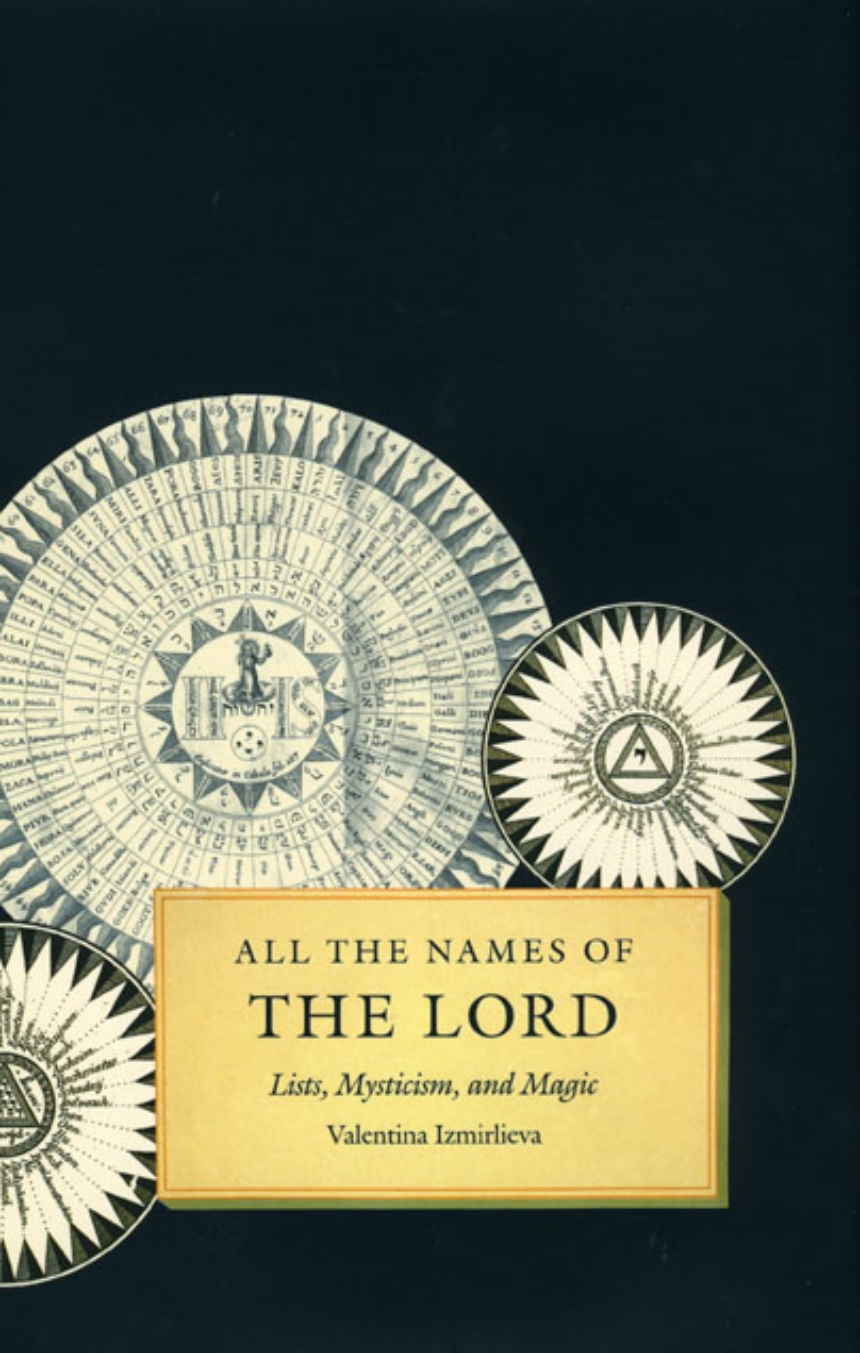All the Names of the Lord
Lists, Mysticism, and Magic
Christians face a conundrum when it comes to naming God, for if God is unnamable, as theologians maintain, he can also be called by every name. His proper name is thus an open-ended, all-encompassing list, a mystery the Church embraces in its rhetoric, but which many Christians have found difficult to accept. To explore this conflict, Valentina Izmirlieva examines two lists of God’s names: one from The Divine Names, the classic treatise by Pseudo-Dionysius, and the other from The 72 Names of the Lord, an amulet whose history binds together Kabbalah and Christianity, Jews and Slavs, Palestine, Provence, and the Balkans.
This unexpected juxtaposition of a theological treatise and a magical amulet allows Izmirlieva to reveal lists’ rhetorical potential to create order and to function as both tools of knowledge and of power. Despite the two different visions of order represented by each list, Izmirlieva finds that their uses in Christian practice point to a complementary relationship between the existential need for God’s protection and the metaphysical desire to submit to his infinite majesty—a compelling claim sure to provoke discussion among scholars in many fields.
This unexpected juxtaposition of a theological treatise and a magical amulet allows Izmirlieva to reveal lists’ rhetorical potential to create order and to function as both tools of knowledge and of power. Despite the two different visions of order represented by each list, Izmirlieva finds that their uses in Christian practice point to a complementary relationship between the existential need for God’s protection and the metaphysical desire to submit to his infinite majesty—a compelling claim sure to provoke discussion among scholars in many fields.
224 pages | 10 halftones | 6 x 9 | © 2008
Language and Linguistics: Anthropological/Sociological Aspects of Language
Literature and Literary Criticism: Slavic Languages
Religion: Christianity, Judaism
Reviews
Table of Contents
Acknowledgments
Introduction
Divine Names as Terms of Order
What Kind of Order?
Lists as Figures of Display
What Is Symbolic Production of Order?
The Material
Part One: The Claim of Theology: “Nameless and of Every Name”
1. The Divine Names and Dionysius the Areopagite
Myth and Mystification
The Exegetes
The Translators
Disputed Authorship and Indisputable Authority
2. Back to the Sources
The Bible and the Name
The Trouble with Logos
The Two Roads, or the Nature of Divine Names
3. The Synthesis of Dionysius
The Dionysian Vision
The Theological Project
United Differentiations
A Hierarchy of Names
Nameless and of Every Name
4. Theory and Practice
Biblical Exegesis
The Proper Name of God Is a List
Listing the Names of God
Part Two: A Magical Alternative: The 72 Names of God
5. How Many Are the Names of God?
The Number of God’s Names
The Larger Context
The Synonymy of 72 and 70
6. A Body of 72 Parts and the 72 Diseases
7. An Apostle for Every Nation
The Division of the Languages at Babel
The Septuagint
The 72 Disciples of Christ
The Ideal Quorum
8. The Peculiar Codex Jerusalem 22
The Facts
A Kabbalistic Hypothesis
The Balkan Context
Three Possible Kabbalistic Indices
The Emphasis on 72
Kabbalah and the World of 72 Parts
9. Christian Culture and the 72 Names
Kabbalah in Christian Garb
The Christian Amulet East and West
10. Printing and the Career of the Slavonic Text
The Miscellany for Travelers and the Remaking of the Text
The Spectacular Aftermath
Building Textual Affinities
Commercial Success
The Abagar of Philip Stanislavov
Epilogue
Two Visions of Order
Religion, Need, and Desire: A Reorientation
Introduction
Divine Names as Terms of Order
What Kind of Order?
Lists as Figures of Display
What Is Symbolic Production of Order?
The Material
Part One: The Claim of Theology: “Nameless and of Every Name”
1. The Divine Names and Dionysius the Areopagite
Myth and Mystification
The Exegetes
The Translators
Disputed Authorship and Indisputable Authority
2. Back to the Sources
The Bible and the Name
The Trouble with Logos
The Two Roads, or the Nature of Divine Names
3. The Synthesis of Dionysius
The Dionysian Vision
The Theological Project
United Differentiations
A Hierarchy of Names
Nameless and of Every Name
4. Theory and Practice
Biblical Exegesis
The Proper Name of God Is a List
Listing the Names of God
Part Two: A Magical Alternative: The 72 Names of God
5. How Many Are the Names of God?
The Number of God’s Names
The Larger Context
The Synonymy of 72 and 70
6. A Body of 72 Parts and the 72 Diseases
7. An Apostle for Every Nation
The Division of the Languages at Babel
The Septuagint
The 72 Disciples of Christ
The Ideal Quorum
8. The Peculiar Codex Jerusalem 22
The Facts
A Kabbalistic Hypothesis
The Balkan Context
Three Possible Kabbalistic Indices
The Emphasis on 72
Kabbalah and the World of 72 Parts
9. Christian Culture and the 72 Names
Kabbalah in Christian Garb
The Christian Amulet East and West
10. Printing and the Career of the Slavonic Text
The Miscellany for Travelers and the Remaking of the Text
The Spectacular Aftermath
Building Textual Affinities
Commercial Success
The Abagar of Philip Stanislavov
Epilogue
Two Visions of Order
Religion, Need, and Desire: A Reorientation
